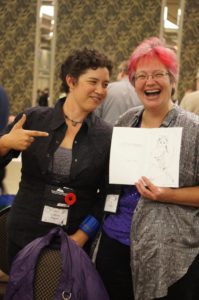 If you’re not familiar with SFWA’s official statement on Galaktika, here it is. If you’re unfamiliar with the situation overall, here is A.G. Carpenter’s write-up and here is Bence Pinter’s Hungarian article.
If you’re not familiar with SFWA’s official statement on Galaktika, here it is. If you’re unfamiliar with the situation overall, here is A.G. Carpenter’s write-up and here is Bence Pinter’s Hungarian article.
The SFWA statement is the result of a lot of work behind the scenes on the part of SFWA’s Grievance Committee, and I’d like to use this opportunity to both thank that committee and explain why it’s one of the answers to “why should I join SFWA?” (There are, in my opinion, a number of others.)
When I first became aware of what Galaktika had done, at first I had difficulty comprehending the scale of it. Surely it had to be a few stories rather than just one or two…but no, it was, literally, dozens. Then three figures worth of stories. Holy criminently.
The excuses that were sent to me as well as others over the course of the investigation chronicled here were manifest and sometimes a bit whiney. I was told that one author’s had been told their book had cost the company money and that therefore they owed it to the company to allow their work to be reprinted as advertisement for the other work.
In all of this, my hands were tied. What, realistically, could SFWA do, given legal and travel costs?
The answer was, actually, a decent amount in terms of keeping those affected informed and negotiating on their behalf, mainly because of the ninjas of Griefcom. Griefcom is the informal name for SFWA’s Grievance Committee, a small group of volunteers led by John E. Johnston III. I love John, whose politics are diametrically opposed to mine and with whom I share amiable political bickering and frequent recipes, and who feels as fiercely as I do that writers deserve both pay and control over their own work.
Griefcom’s members handle different areas: Ian Watson was the point person for the Galaktika issues and drafted the report on which I based SFWA’s formal statement about the magazine after much discussion with Johnston, Watson, and the SFWA board. Other members include Michael Armstrong (Novels), John Barnes (Work Made For Hire/Bookseller Relations), Michael Capobianco (Special Projects), Elizabeth Anne Leonard (Mediator), Lee Martindale (Senior Mediator), Ron Montana (TV and Film), and Eric James Stone (Short Fiction). Right now we are looking for someone experienced with game issues; drop volunteer@sfwa.org a line if you’re a member interested in volunteering.
Griefcom’s main weapon is the fact that it operates behind the scenes, and goes public only when necessary, which is why they came and asked me to make a statement about the situation. From my vantage point, I get a better picture than most people of what Griefcom does, and it’s a lot. Want to protect yourself so you won’t need their intervention? Read your contracts and never sign anything you don’t understand. Griefcom has been negotiating with Galaktika on behalf of several writers for months; they finally decided it was time to say something publicly.
Will Galaktika shape up? It remains to be seen. I hope so, and SFWA will revisit the matter in three months to follow-up and let folks know what Galaktika has done in the interim.
Is this actually a matter that SFWA should concern itself with? Absolutely. Recently it’s been underscored for me that people perceive SFWA as an American entity, but the truth is that we have a substantial international contingent. Worldcon in Finland poses a chance to spread that message, and so here’s a few things that I’m doing.
- SFWA members scanning the most recent copy of the Singularity, SFWA’s bi-monthly e-newsletter for members, to find volunteer opportunities, will have noticed that I have a call out for translators. My plan is to get the SFWA membership requirements and questionnaire translated into as many languages as possible; I have commitments for Chinese, Filipino, Finnish, French, Klingon, Portuguese, Russian, and Spanish versions and am pursuing others. If you’re interested in helping with that effort, please let me know.
- At the suggestion of Crystal Huff, I’m thinking about programming that might spread the message, such as a panel on the internationalization of SFWA. Such a panel would work for many conventions, I would think, but debuting it in Finland seems like a great idea (although we might sneak peek it at the Nebulas next May in Pittsburgh.)
- I’m mulling over what form something connecting translators and F&SF writers might look like. Translating fiction requires not just ability with the language, but a writerly sensibility, an understanding of how to make the sentences fluid and compelling and three dimensional. So maybe something where potential translators could submit a listing of translation credits along with sample of their own work, translated into the languages they’re adept in, backed up with the ability for SFWA members to post testimonials. This seems like something the field needs; if anyone’s aware of existing efforts along these lines, please let me know?
- Maybe it’s time for a new version of The SFWA European Hall of Fame, this time The SFWA International Hall of Fame. That seems like something for me to discuss with our Kickstarter contact. She and I have been discussing a 2018 project, reviving the Architects of Wonders anthology, but this might make a good interim effort. (Speaking of Kickstarter, SFWA partners with over three dozen institutions and companies, including Amazon, Kickstarter, and Kobo to make sure member concerns and suggestions are passed along as well as new opportunities created. If you’d like to be on the Partnership committee handling these monthly check-ins, drop our volunteer wrangler Derek a line at volunteer@sfwa.org.)
I’m actively soliciting feedback and suggestions for other ways to help spread the world that SFWA isn’t just for Americans. Let me know what you think.
(And, gah, I know I need to poke the gamewriting stuff along. I thought the Board was getting it done in my absence. I apologize, gamewriters. We ARE working on it. So many plates, all spinning so busily.)





 My last day is June 30, 2019, wheeeeeee, after which I will have been Vice President of the
My last day is June 30, 2019, wheeeeeee, after which I will have been Vice President of the 


 The President needs to not give into the temptation to Do All the Things, because there will be a constant stream of people bearing all manner of projects, many of them things that really do need to be done. Therefore the President needs to be someone good at working with or steering people to the Volunteer Coordinator to find roles for volunteers that will be rewarding for both sides as well as working with the Volunteer Coordinator to make sure volunteers are getting recognized.
The President needs to not give into the temptation to Do All the Things, because there will be a constant stream of people bearing all manner of projects, many of them things that really do need to be done. Therefore the President needs to be someone good at working with or steering people to the Volunteer Coordinator to find roles for volunteers that will be rewarding for both sides as well as working with the Volunteer Coordinator to make sure volunteers are getting recognized.


77 Responses
Thanks for sharing – you are doing an amazing job Cat and seeing your posts like this might just get me back in SWFA.
In fact – going to look at the membership information now.
Took the plunge – now I have to see if I can find the contract or emails from Baen’s Universe from 2007 to provide the supporting documents – Should have used my other pro-sale – I can make a copy of the physical TOC from Creature Fantastic – but not the TOC from an online magazine from 2007. YIKES
You can probably chat with Kate Baker, as there may be wiggle room in your supporting documents?
I was lucky and found the emails Eric and I swapped during the editing process as well as where he sent the contract via email – so yay!
RT @Catrambo: The Ninjas of Griefcom: More on Galaktika Magazine, SFWA, and International Writers: https://t.co/6qCs4ahav6
@Catrambo @mcahogarth There might be useful resources and contacts in the American Translators Association https://t.co/WuUuNC4BFi
@Catrambo @mcahogarth Also possibly with ProZ, which is a freelance translator network https://t.co/U9omJ1tA9a
Kelli Stasi liked this on Facebook.
Danielle Myers Gembala liked this on Facebook.
Catherine Lundoff liked this on Facebook.
Ronnie Virdi liked this on Facebook.
RT @Catrambo: The Ninjas of Griefcom: More on Galaktika Magazine, SFWA, and International Writers: https://t.co/6qCs4ahav6
You’re all doing amazing work. I also got a little chuckle in seeing Klingon in the translation list. 🙂
This is why I asked SFWA’s resident Klingon expert about it. 🙂 I’d love to add some other fictional languages to the list.
This is why I asked SFWA’s resident Klingon expert about it. 🙂 I’d love to add some other fictional languages to the list. http://www.kittywumpus.net/blog/?p=8584#comment-43343
RT @Catrambo: The Ninjas of Griefcom: More on Galaktika Magazine, SFWA, and International Writers: https://t.co/6qCs4ahav6
Dave Heyman liked this on Facebook.
Nona Rambo liked this on Facebook.
Tom Fritter liked this on Facebook.
Jaime O. Mayer liked this on Facebook.
Ron Friedman liked this on Facebook.
RT @Catrambo: The Ninjas of Griefcom: More on Galaktika Magazine, SFWA, and International Writers: https://t.co/6qCs4ahav6
RT @Catrambo: The Ninjas of Griefcom: More on Galaktika Magazine, SFWA, and International Writers: https://t.co/6qCs4ahav6
For those of us without an agent and a comparatively small amount of stories, is there a list somewhere?
Yes, it is included in the SFWA statement.
If you are having difficulty finding it, check with griefcom and they may be able to help.
SFWA, authors, & help w/grievances in publishing https://t.co/Z654SFHSMH
Helen Forsyth liked this on Facebook.
Patrice Sarath liked this on Facebook.
Christie Yant liked this on Facebook.
Yang-Yang Wang liked this on Facebook.
RT @lisajanicecohen: SFWA, authors, & help w/grievances in publishing https://t.co/Z654SFHSMH
Richard Thomas liked this on Facebook.
Emily French liked this on Facebook.
Michelle Corsillo liked this on Facebook.
Raven Oak liked this on Facebook.
Bishop O’Connell liked this on Facebook.
Stephen Gold liked this on Facebook.
Jody Lynn Nye liked this on Facebook.
Jennifer Wilson liked this on Facebook.
RT @Catrambo: The Ninjas of Griefcom: More on Galaktika Magazine, SFWA, and International Writers: https://t.co/6qCs4ahav6
Trent Walters liked this on Facebook.
Stephen Gordon liked this on Facebook.
Jason Floyd liked this on Facebook.
Brandon Ketchum liked this on Facebook.
Melanie Rambo liked this on Facebook.
JW Alden liked this on Facebook.
Barbara Ann Caldwell-Pease liked this on Facebook.
Shawn Scarber liked this on Facebook.
Anatoly Belilovsky liked this on Facebook.
Fábio Fernandes liked this on Facebook.
The Ninjas of Griefcom: More on Galaktika Magazine, @SFWA, and International Writers: https://t.co/6qCs4ayLTG
RT @Catrambo: The Ninjas of Griefcom: More on Galaktika Magazine, @SFWA, and International Writers: https://t.co/6qCs4ayLTG
RT @Catrambo: The Ninjas of Griefcom: More on Galaktika Magazine, @SFWA, and International Writers: https://t.co/6qCs4ayLTG
RT @Catrambo: The Ninjas of Griefcom: More on Galaktika Magazine, @SFWA, and International Writers: https://t.co/6qCs4ayLTG
What a mess. “SFWA is saddened by the need for this statement, given Galaktika’s once good reputation. Back in… https://t.co/MRZUb3GcCf
RT @Catrambo: The Ninjas of Griefcom: More on Galaktika Magazine, SFWA, and International Writers: https://t.co/6qCs4ahav6
Anna O’Connell liked this on Facebook.
Setsu Uzume liked this on Facebook.
Shaoyan Hu liked this on Facebook.
John McColley liked this on Facebook.
Usman Tanveer Malik liked this on Facebook.
Beth Morris Tanner liked this on Facebook.
Lee Whiteside liked this on Facebook.
Dora Badger liked this on Facebook.
Aaron Kashtan liked this on Facebook.
Richard Chwedyk liked this on Facebook.
I’m all for internationalization of @SFWA… with the state of Hungarian #sff short story market, I tend to submit more and more in English.
The Ninjas of Griefcom: More on Galaktika Magazine, SFWA, and International Writers https://t.co/TX0yBrJOSE
The Ninjas of Griefcom: More on #writingfiction #writingtips #fictionwriting #fiction https://t.co/xDvOzkm3lZ https://t.co/lmjvxlapTc
John Chu liked this on Facebook.
Gibson Michaels liked this on Facebook.
Tasha Turner Lennhoff liked this on Facebook.
DeAnna Knippling liked this on Facebook.
Sara A Mueller liked this on Facebook.